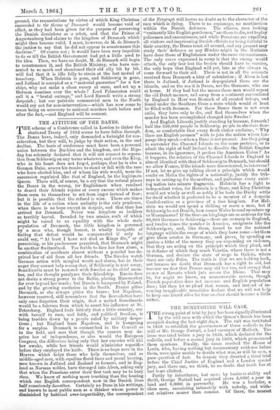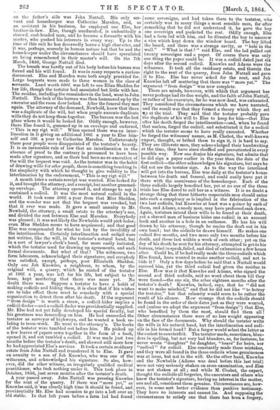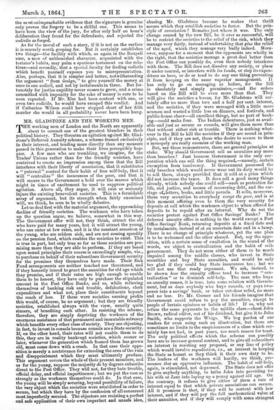THE DERBYSHIRE WILL CASE.
THE strong point of trial by jury has been signally illustrated by the will case with which the Queen's Bench has been occupied during the last eight days. The suit was instituted in 1858 to establish the genuineness of three codicils to the will of Mr. George Nuttall, a land surveyor of Matlock. The issue was tried before a jury in 1859, which declared for the codicils, and before a second jury in 1860, which pronounced them spurious. Finally, the cause reached the House of Lords, who, having nothing but documentary evidence before them, were quite unable to decide what was, as will be seen, a pure question of fact. In despair they directed a third trial before the Chief Justice of England and a London special jury, and there can, we think, be no doubt that truth has at last been elicited. Partly by inheritance, but more by business ability and thrift, George Nuttall had acquired above 2,0001. a year in land and 8,0001. in personalty. He was a bachelor, a close man, associating intimately with nobody, and with- out relatives nearer than cousins. Of these, the nearest on the father's side was John Nuttall. His only ser- some sovereigns, and had taken them to the testator, who vant and housekeeper was Catherine Marsden, and, as certainly was in many things a most sensible man, for after an assistant in his business, he employed one Else, her remarking that he did not understand it, he gave the boy brother-in-law. Else, though uneducated, is undoubtedly a one sovereign and pocketed the rest. Oddly enough, Else shrewd, cool-headed man, and he became a favourite with his had a farm lad with him, and he directed the boy to unscrew master, who pushed his interests in every way. Up to the a vice which kept down the window board. The boy lifted time of this suit he has deservedly borne a high character, and the board, and there was a strange cavity, or " hole in the it was, perhaps, scarcely inhuman nature but that he and the wall." " What is that ? " said Else, and the lad pulled out housekeeper under the circumstances should have speculated twenty sovereigns and a paper. Of course there was only on being remembered in their master's will. On the 7th one thing the paper could be. It was a codicil dated just six March, 1856, George Nuttall died. days after the second codicil. Knowles and Adams were the The breath was hardly out of his body before his bureau was witnesses. It took all the residuary estate, and therein the forced and his will found. It was in many respects a curious right to the rent of the quarry, from John Nuttall and gave document. Else and Marsden were both amply provided for it to Else. Else has never asked for the rent, and Job Large bequests were made to three women in the class of Knowles left off muttering that there was "more yet." The servants. Land worth 6001. was left to one Eliza Sheldon for argument "from design" was now complete. her life, though the testator had associated but little with her. There are minds, however, with which that argument has The residue, including the remainders in the land, went to John never perhaps had its due weight, and the faith ofJohn Nuttall, Nuttall. The lock of the bureau was then hammered up by the or rather of his executors, for he was now dead, was exhausted. executor and the room door locked. After the funeral they met They considered the circumstances which we have narrated, again. The attorney of the deceased, Newbold, knew that there and the result was that they formed a theory which they set was a duplicate of the will, but when people execute duplicate up at the trial. They said that the testator probably gave wills they do not keep them together. The bureau was the last the duplicate of his will to Else to keep for him—that Else place where it would be looked for. Oddly enough, however, after his death forged the interlineation—and, when he found there Else found it, gummed up in an envelope and endorsed, that useless, forged the codicil, and substituted it for a codicil " This is my rigt will." When opened there was an inter- which the testator seems to have really executed. Whether lineation in it giving an additional 1001. a year to Else him- he forged the witnesses' names, as M. Chabot, the well-known interlineation by the endorsement, " This is my rigt will." between his death and funeral, and could easily have put it these poor people were disappointed of the testator's bounty. They are illiterate men, they acknowledged their handwriting It is an inexorable rule of law that an interlineation in the at the time, they have since shuffled and prevaricated in every absence of proof to the contrary is presumed to have been possible way. Now one denies his signature, but admits that made after signature, and as there had been no re-execution of he did sign a paper earlier• in the year than the date of the the will the bequest was void. As the testator was in the habit first codicil—the other acknowledges his signature, but says he of drawing wills for other people, there is something touching in did not see the testator sign. As to the way the interlined the simplicity with which he thought to give validity to the will got into the bureau, Else was daily at the testator's house October, 1856, just seven months after the testator's death. thought the codicils all forgeries, the executors and others who A year passed away. John Nuttall was pressing Knowles knew the testator's signature, having no interest in the matter, for the rent of the quarry. If there was "more yet," as one and all, considered them genuine. Circumstances are, how- Knowles said, it wasclearly high time it should be found, and ever, in some sort better evidence than positive testimony. providentially Mr. Else had occasion to go into a loft over an They have no interests and cannot lie. And supposing the old stable. In that loft years before a farm lad had found circumstances to satisfy one that there has been a forgery, the most unimpeachable evidence that the signature is genuine only proves the forgery to be a skilful one. This seems to have been the view of the jury, for after only half an hour's deliberation they found for the defendants, and rejected the codicils as forged.
As for the moral of such a story, if it is not on the surface it is scarcely worth groping for. But it certainly establishes two things—the facility with which, as again in the Roupell case, a man of unblemished character, acquainted with the testator's habits, may palm a spurious testament on the rela- tives—and secondly, that a special faculty for finding codicils which benefit yourself exposes you to misrepresentation. Also, perhaps, that it is simpler and better, notwithstanding the argument " from design' ' to give yourself the money at once in one codicil, and not by instalments in three. But for- tunately for justice cupidity never ceases to grow, and a crime committed with impunity for the sake of money is sure to be soon repeated. If Mr. Else had been content with one, or even two codicils, he would have escaped this verdict. And if Catherine Wilson could have stopped short of her fifth murder she would in all probability never have been hung.
































 Previous page
Previous page